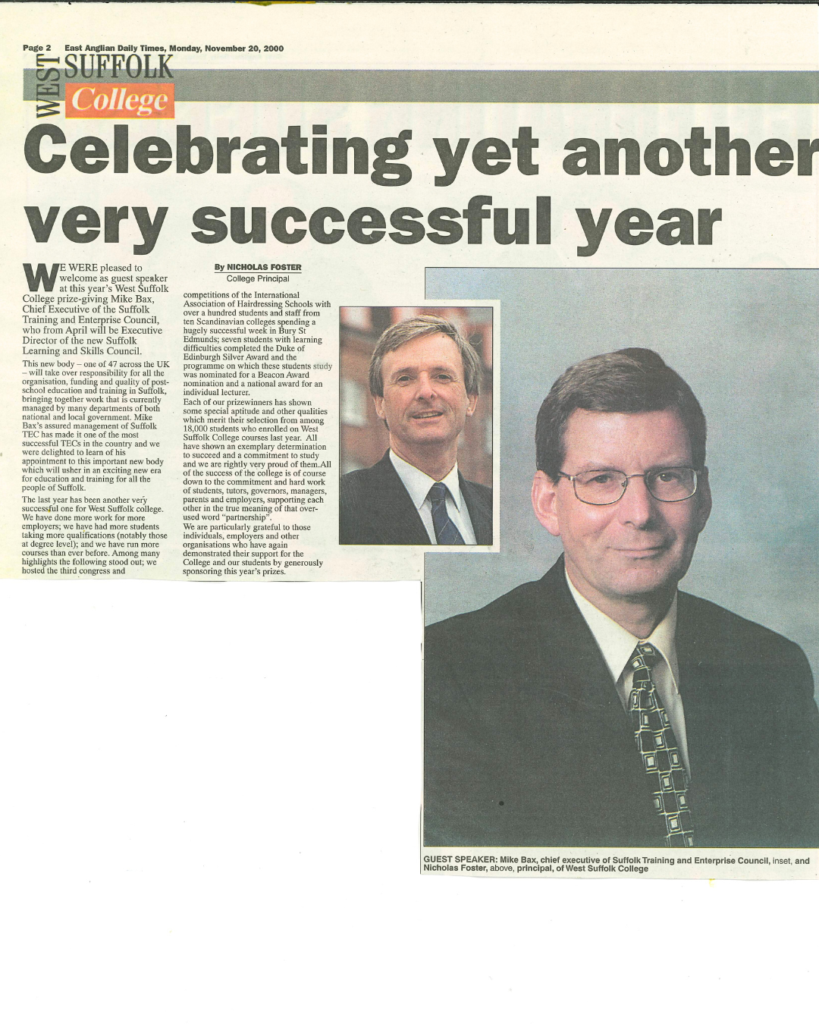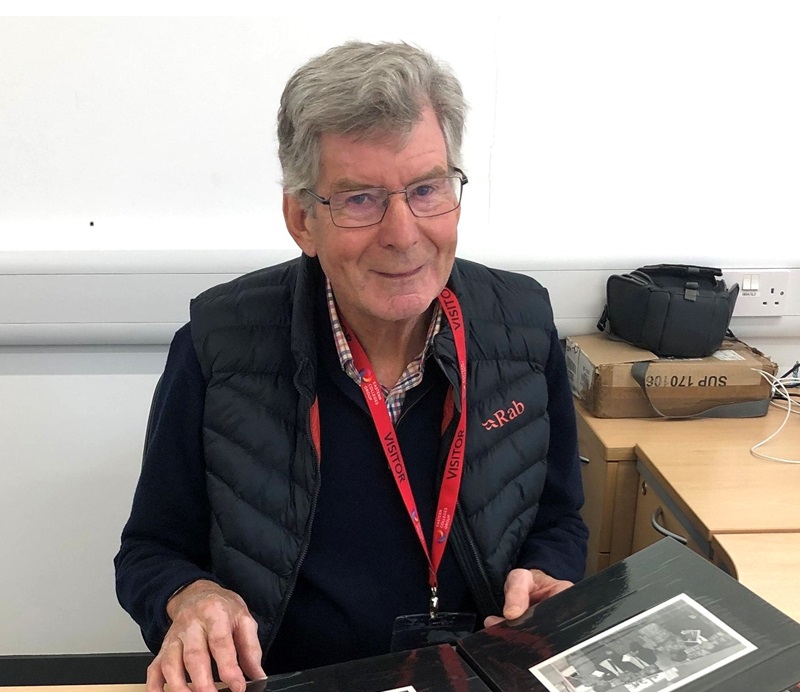Nick Foster joined West Suffolk College as Vice Principal on the 1st of January 1988, working alongside Ken Masters (Vice Principal for Resources) during a transformative period for the college. With a background in curriculum development and a deep commitment to staff training, Nick played a pivotal role in expanding full-time education, launching new subject areas, and introducing a staff development policy that laid the groundwork for the college’s long-standing focus on quality.
Throughout his leadership, Nick helped steer the college through significant milestones, including Incorporation in 1993, which transitioned WSC from local authority control to an independent, self-governing institution. As Principal from 1995, he oversaw numerous campus developments – such as the new library and Gibraltar House – as well as international collaborations, curriculum growth, and the expansion of adult and special needs education.
Nick’s visionary approach to leadership, education, and community engagement has left a lasting legacy, shaping West Suffolk College into a thriving and ambitious institution during a key chapter of its history.

Joining as Vice Principal
I joined West Suffolk College on 1 January 1988 as Vice Principal (Academic), working alongside Ken Masters, Vice Principal for Resources. At the time, the college had four Heads of Faculty. When Ken left to become Principal of Melton Mowbray College, John Shipston (Principal from around 1985 to 1995) restructured the leadership team, appointing just one Vice Principal, a Head of Finance (David Howells), and a Head of Curriculum (Ann Williams). Mick Fell, who had been Clerk to the Governors for Suffolk County Council (SCC), was appointed to the College in that same role.
Growing the curriculum and student numbers
In 1988, we continued to run a large CPVE (Certificate of Pre-Vocational Education) programme, with around 500 school students (Years 10 and 11) attending the college two days per week. This helped increase interest in full-time courses and contributed to growing 16 – 19 student numbers. We expanded the curriculum to include catering, social care, and business studies (BTECs). Australia House opened, housing Hair and Beauty, Catering, and Art and Design. Special Needs provision also expanded in Minden House.
We produced our first full-time course brochure around 1989, which I was able to present to Year 11 students at all 12 West Suffolk schools – our relationship with the schools was strong while CPVE lasted (it ended around 1992/93). Gordon Iredale, a business studies lecturer, was appointed part-time marketing officer. We also launched an expanded prize-giving event at the Corn Exchange (now Wetherspoons), featuring high-profile speakers and gaining good publicity.
Staff development and focus on quality
In 1988–89, I introduced a new staff development policy. Although funds were held at County Hall, they were underused by other colleges. With our new policy – an early version of the post-1993 appraisal model – we were able to draw down more than our share of FE funding. Every full-time lecturer was required to complete a PGCE, and we introduced extensive middle manager training. Barbara Wilkins was appointed Staff Development Officer, and all lecturers (later all permanent staff) were expected to maintain a staff development plan. I believe this focus on quality was the foundation for the improvements that eventually led to the college achieving an Outstanding grade under Ann Williams’ leadership.
Funding challenges and preparing for incorporation
Before 1992, SCC’s formula for distributing funds to colleges was unclear. Suffolk College received about half the funding, Lowestoft College a quarter, and WSC and Otley the remainder – regardless of student numbers. A more rational model was introduced in 1992, anticipating the national funding system (FEFC) launched in 1993.
Under the chairmanship of Richard Stewart, governors became more involved, forming committees on Finance, Curriculum and Quality, and Staff Development. As part of our international work, we maintained a strong exchange with the Ferdinand von Steinbeis Schule in Reutlingen, Germany. We also visited Reutlingen and later Kansas City College in the U.S., exploring the opportunities Incorporation might bring.
Incorporation and expansion
As we prepared for Incorporation, Paul Collins (MD of Haverhill Meat Products) and David Howells worked on financial planning, while Tony Dahlman (MD of NIL-Fisk) and I focused on employment matters. We began expanding income through self-financing courses, growing our employer training and apprenticeship programmes. Andrew Hunter, a local businessman, joined the Senior Management Team as Marketing Director.
On 1 April 1993 – Incorporation Day – we marked the occasion with a civic procession across Angel Hill and a packed service at the Cathedral. It was a memorable event, attended by all full-time students.
Leadership and campus development
Following John Shipston’s retirement in 1995, I took over as Principal. We quickly moved to redevelop the area behind the old front building with a new library. The John Shipston Computer Centre was established in the Harvey Frost Hall. The 1995–96 academic year brought challenges, including the tragic death of Roger Mathers, a popular Engineering lecturer, a major computer theft, and a difficult redundancy and reorganisation process.
Despite a tight budget, we secured borrowing and planned a £2.6 million development, including a new Gibraltar House to accommodate General Studies, Humanities, Art and Design, SEN, a drama studio, a Mechatronics centre, a library, and a new student common room.
International and adult learning expansion
Under the “Britain in Europe” initiative, we formed links with colleges in Italy, Denmark, Belgium, and France. Hair and Beauty staff participated in international competitions and hosted the 3rd Congress of the International Association of Hairdressing Schools, with over 100 visitors from 10 Scandinavian colleges.
Through a family connection, I helped establish a link with a university in Beijing. Their staff visited us, and we hosted one of their IT technicians for a year. Martin Vella took a group of Art and Design students to China, and other staff also made visits. We briefly recruited around 25 Chinese students for HE courses, but the support demands were too great, and we redirected them to other universities.
We expanded adult learning by opening learning centres with flexible computer access and relocating adult education in towns like Mildenhall, Sudbury, Newmarket, Brandon, Thetford, and eventually Stowmarket. By 1999, our adult ed provision had grown substantially, with up to 12,000 enrolments.
Curriculum development and student success
We continued to grow full-time provision, adding National Diplomas in Art and Design, Performing Arts, Engineering, and Construction, each supported by a First Diploma route. This structure gave students with lower GCSE results a clear path to Level 3 and beyond. Sports students joined our new Academy, coached while studying full-time. Danny Laws, who later managed local professional football clubs, helped the Academy flourish. In 1999, our team reached the inter-college finals at West Bromwich Albion’s ground, though unfortunately they didn’t win!
Special needs and higher education
Our STEPS course for students with special needs was innovative and successful. In 2000, seven students earned Duke of Edinburgh Awards, and Marianne Beamish was nominated for a Beacon Award. A well-respected headteacher in Suffolk sent his son to STEPS and praised it highly.
We also strengthened links with Anglia Ruskin University, validating our Cert Ed, HNCs, and HNDs. We developed new Access to HE and degree-level courses in Humanities, Social Care, and Business.
Reflections
I thoroughly enjoyed my 15 years at West Suffolk College working with so many
great staff and governors – it was certainly the happiest and most
fulfilling period of my career! I look back with pride on everything we achieved together.
A message to future students and staff
Make the best of the facilities and opportunities West Suffolk College offers – they surpass nearly every other college in the region!




